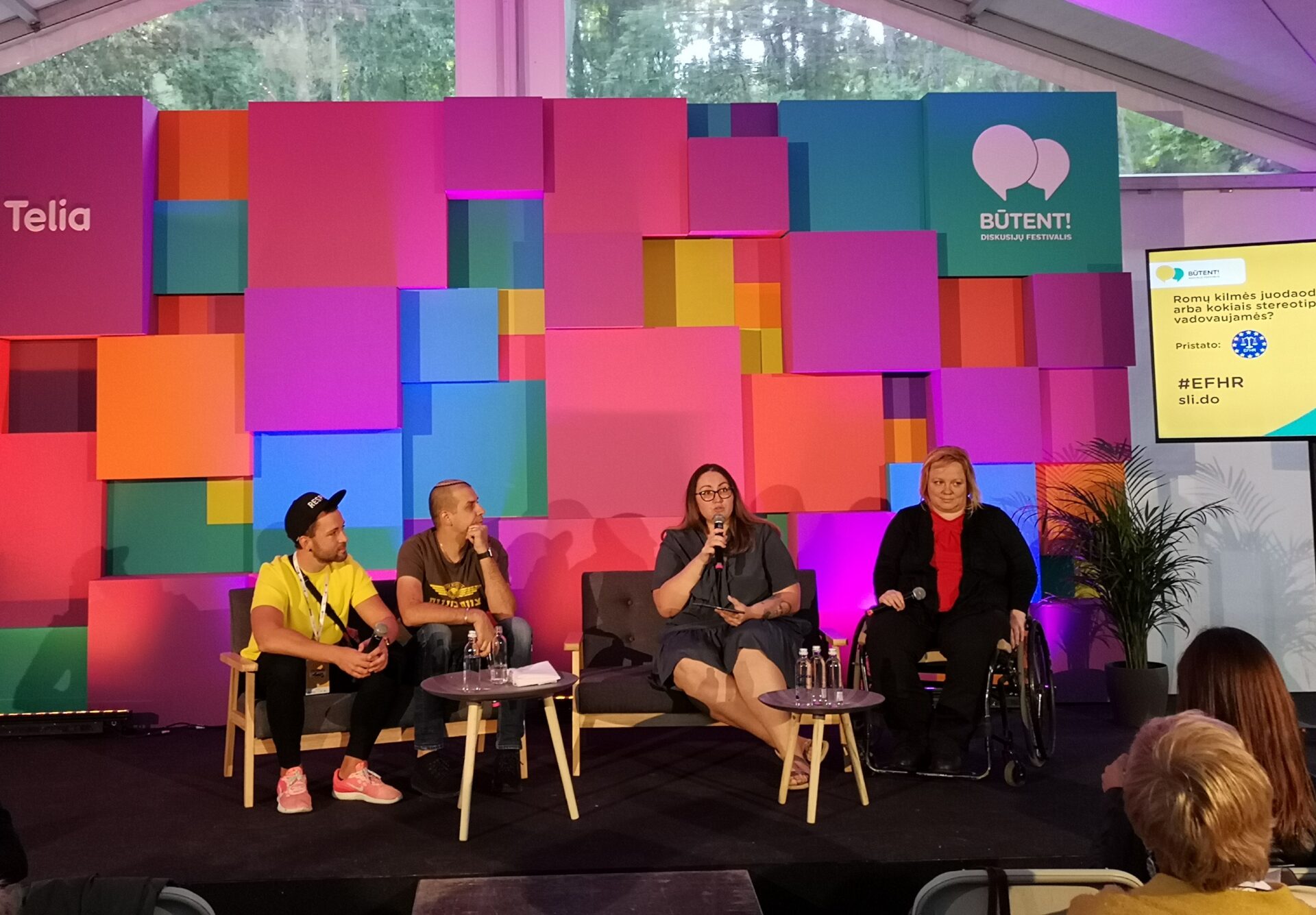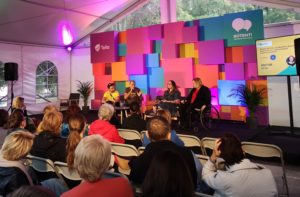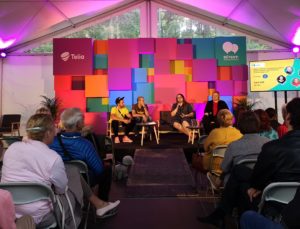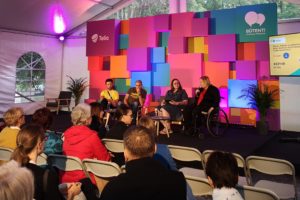- 2019/09/17
EFHR discussion at “Būtent!” festival: “Let’s be communal, not tolerant”

This year, the European Foundation of Human Rights (EFHR) has reappeared at the discussion festival “Būtent!” (eng. “Exactly!”), which took place in Birštonas. At the festival on 6th September, the EFHR organized a discussion on stereotypes: “Black homosexual of Romany origins or what stereotypes do we follow?”. The moderator of the event, EFHR lawyer Evelina Dobrovolska, spoke with the member of Vilnius City Council Tomas Vytautas Raskevičius, who presents himself as a professional gay, with Daniel Lupshitz, a social activist and an active member of the Jewish community, as well as former advisor of Vilnius’ Mayor, and with Vaiva Vėželytė-Pokladova, the head of the Ethnic Minorities Policy Analysis and Information Division of the Department of National Minorities under the Government of the Republic of Lithuania (TMD). The discussion focused on the different forms of discrimination faced by minorities and asked whether society is becoming more tolerant and what it means to not be a white heterosexual man.
Societies with different national, religious or gender identities often become targets of not only stereotypes, but of hate speech or hate crime as well. The participant of the discussion T. V. Raskevičius highlighted the importance of all society groups, especially in political life. He noted that upon having to get to know and work with these social groups themselves, the society’s attitude towards minorities is changing. T. V. Raskevičius also told how members of minorities are described by the labels imposed solely on them: “<…> it is important to realize that my identity, the fact that I am a member of the LGBT community, does not explicitly define me <…>. I am both a citizen and a person”, noted Raskevičius.
When questioned by the moderator about the stereotypes among the social minorities themselves, V. Vėželytė-Pokladova stated that clichés about other social groups are prevalent there as well. The TMD representative also raised the question – should positive stereotypes be acceptable? Having immersed in the discussion, D. Lupshitz noted that the rise of stereotypes in Lithuania may have been influenced by the period of Soviet occupation, when people had no opportunity to be themselves. He also told the story about the emergence of the stereotype about Jews making love through the hole in the sheets and shared his thoughts on “tolerance” as a term for “accepting something”. “Tolerance is a nasty word. Let’s be communal, not tolerant”, offered Daniel Lupshitz.
Halfway through the discussion, T. V. Raskevičius noted that in order to be heard, the members of social minorities have to work twice as much than others. Evelina Dobrovolska also noted on this topic that in society, people belonging to socially vulnerable groups are often seen as disadvantaged, what can be turned into positive qualities or even a part of their identity. Vaiva Vėželytė-Pokladova told that she did not accept her identity as a disabled person and shared a personal story when a physiotherapist offered her to go where everyone is “like her”. “Listen, isn’t there a camp for men who are getting old and bald?” then answered the woman to the physiotherapist who tried to wittily mock her.
As the discussion turned towards the reduction of stereotypes, Daniel Lupshitz encouraged to simply talk, to debate – then there will be no need of tolerance, the stereotypes will disappear. Vaiva Vėželytė-Pokladova expressed herself similarly and advised to get to know the neighbors first because real experience is much more truthful, while Tomas V. Raskevičius gave the discussion a positive light, noting the rapid changes taking place in Lithuania: “Lithuania is a small human rights miracle.” According to the speaker, human rights are increasingly respected and assimilated in Lithuania, compared to neighbors from the East. D. Lupshitz shared the views of his colleague, noting the importance not to rest on our laurels and continue striving for good results.
Participants of the discussion argued about the topic of political correctness, raised by one of the members of the audience. V. Vėželytė-Pokladova stated that political correctness is an important part of human rights, ensuring that national minorities are not referred to using unacceptable terms, while T. V. Raskevičius noted that if society becomes too correct, its certain segment may not find appropriate ways to express dissatisfaction, what may lead to more serious consequences. The moderator summarized the opinions of the speakers, highlighting the importance of being familiar with the context – whether the word itself has negative connotations and what is meant by it.
Another question was raised by a member of the audience – how do people belonging to minorities recognize themselves as being different from what is expected of them and, by identifying themselves, help the rest of society understand them? The participants of the discussion admitted that a single, universal recipe does not exist for such a complex problem, but still shared a few tips. “When you accept yourself as you are, no one can harm you”, said T. V. Raskevičius. Daniel Lupshitz encouraged every one of us to take at least one step forward and search for the answers to emerging questions, while Vaiva Vėželytė-Pokladova pointed out that most conflicts are due to the fact that not everyone meets the standards we have created in our own minds. According to her, the rule is: “It doesn’t matter what people think of me or where they attribute me, I don’t have to feel that way.”
At the end of the discussion, moderator E. Dobrovolska asked the participants the last question – so what are stereotypes: the basis of discrimination and hate or the consequences of ignorance? The participants were not unanimous: according to T. Raskevičius, if stereotypes do not limit human freedom but help enter a dialogue, it is not a bad phenomenon. Daniel Lupshitz, on the other hand, stated that stereotypes are always bad and emphasized the importance of education in reducing them. Vaiva Vėželytė-Pokladova summarized that everything depends on the person’s evaluation and their own attitude.
We thank the organizers of the “Būtent!” festival for the opportunity to have a constructive discussion, the speakers of our discussion and all those interested. You can view the full discussion on our Facebook page.






